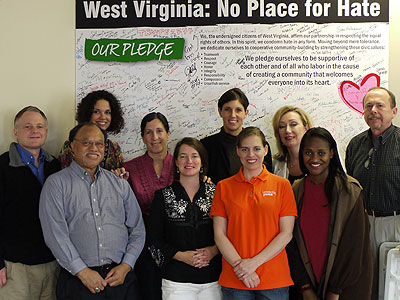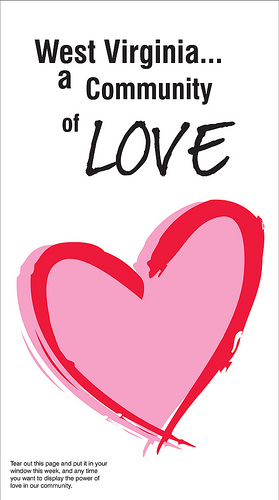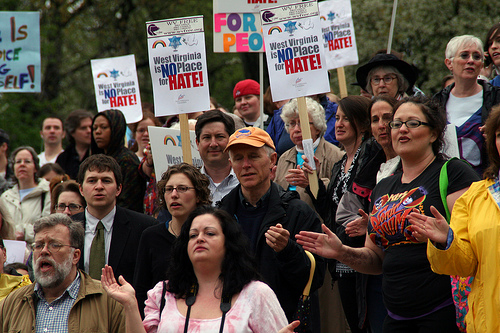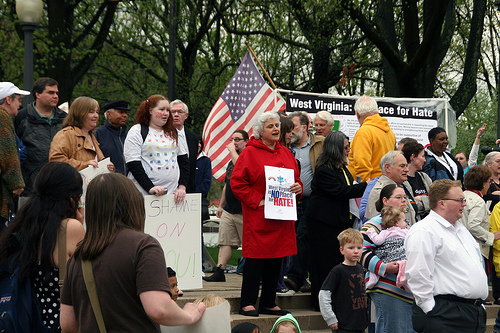
What can a community do when a hate group comes to town and targets a wide variety of organizations, each of which have different ideas of how to respond -- or not?
That's what happened in Charleston and Wheeling, West Virginia in March 2010. The Westboro Baptist Church hate group announced it would picket Jewish and Catholic institutions, a local university, and, as a last-minute addition designed for maximum emotional anguish, the Montcoal Mine, where a dozen miners had just lost their lives.
How could the community respond, particularly when some people preferred to keep a low profile, while others wanted to stage a loud counter-protest? Who could even lead such a community response, given the different values of the targeted groups?
A coalition of local leaders convened at Temple Israel, one of the targeted institutions, and decided they had to present a united front. The message had to be broad enough to include everyone, but specific enough to show opposition to the hatred espoused by Westboro.
Members of OneKanawha (pictured above), the Not In Our Town affiliate in Charleston, took a leading role in the discussion. Paul Sheridan, associate attorney general for West Virginia and a long-time Not In Our Town supporter, says the group turned to the NIOT tool box for ideas.
First, be inclusive: All the targeted institutions had to be at the planning meeting, because all were part of the conversation.
Second, focus on the positive: Whatever responses were planned had to proclaim positive messages of love and acceptance, rather than lash out at the hate group.
Third, make the action as broad-based as possible, incorporating all constituencies from law enforcement to youth, and all ages and cultures.
"This is part of the Not In Our Town method," Sheridan says. "We had to make sure we weren't building conflict into it. Three-quarters of all the things we did here came out of the Not In Our Town playbook, whether people were thinking about it or not. These are strategies that have worked their way into people's consciousness."
The approach was multi-pronged, as described in our blog posting that week on NIOT.org:
- a full-page ad in the local newspaper proclaiming West Virginia's commitment to love and acceptance
- a unity pledge for community members to sign
- signs for people's front lawns, provided by the West Virginia State Chamber of Commerce
- a dancing flash mob that deflected attention from Westboro's message of hate
- a "stop the hate" rally on the steps of the Capitol building
 The ad campaign was spearheaded by Rabbi Cohn of Temple Israel, one of the targeted institutions. While brainstorming one evening with his wife, he remembered Billings, Montana, the subject of the first Not In Our Town film, where thousands of residents put paper menorahs in their windows to demonstrate unity with one Jewish family targeted by bigots. The Cohns came up with the idea of a big pink heart, to demonstrate West Virginians' capacity for love.
The ad campaign was spearheaded by Rabbi Cohn of Temple Israel, one of the targeted institutions. While brainstorming one evening with his wife, he remembered Billings, Montana, the subject of the first Not In Our Town film, where thousands of residents put paper menorahs in their windows to demonstrate unity with one Jewish family targeted by bigots. The Cohns came up with the idea of a big pink heart, to demonstrate West Virginians' capacity for love.
That heart was at the center of the ad campaign that ran in the Charleston Gazette and Local Mail at a discounted rate, highlighting the importance of bringing local media on board. The ad asked locals to sign a unity pledgebased on a similar pledge created by students at Stanford University in Palo Alto, CA that coalition members had seen on NIOT.org.
The state Chamber of Commerce ordered more than 600 lawn signs, which residents were encouraged to pick up and display in their front yards.
As preparations continued, challenges were turned into opportunities. A group of LGBT students at Marshall University in nearby Huntington "were very angry," says Amy Weintraub, director of Covenant House, another targeted institution. They wanted to stage a loud protest against Westboro. "We needed to channel that energy in a positive way," she says.
The solution? A dancing flash mob that appeared several blocks away from the Westboro pickets, drowning out its message of hate with a spirited disco rendition of John Denver's paean to West Virgina, "Country Road."
 As a less energetic alternate, a "stop the hate" rally was held on the Capitol steps, again demonstrating the city's solidarity with all its residents.
As a less energetic alternate, a "stop the hate" rally was held on the Capitol steps, again demonstrating the city's solidarity with all its residents.
"People were excited to be part of something positive," says Rabbi Cohn.
The coalition learned another lesson that week: Even when the best outreach efforts don't satisfy everyone, that does not diminish the good such a campaign can accomplish.
A group of counter-protesters showed up at one Westboro picket site, and exchanged harsh words with the hate group. Police got involved, casting a pall over the otherwise peaceful community response. Coalition members acknowledged the problem, and instead of distancing themselves from the protesters, tried to figure out how they could have incorporated them better.
"Everyone in the community has the right to choose their own approach," Rabbi Cohn points out. The coalition "strongly asked people not to go to the sites," he says, but couldn't compel everyone to follow the coalition's program.
 Could the coalition's message have been more inclusive? Or, on the other hand, was it watered down too much? Was the dancing flash mob the right tactic, or was it not strong enough to channel the anger of some younger community members? The LGBT community felt particularly victimized, Rabbi Cohn notes, and he wonders if the coalition could have done things differently.
Could the coalition's message have been more inclusive? Or, on the other hand, was it watered down too much? Was the dancing flash mob the right tactic, or was it not strong enough to channel the anger of some younger community members? The LGBT community felt particularly victimized, Rabbi Cohn notes, and he wonders if the coalition could have done things differently.
"To this day, I go round and round about our language," he admits.
The coalition that came together to stand up to Westboro's hatred became the spark of something new that coalition members want to keep alive. A follow-up meeting the next week focused on building a quick-response network to help the community face similar future crises.
"We are not just looking backward, we are looking forward," says Paul Sheridan. "This had the potential to be so unbelievably explosive. But it gave us an incredible opportunity for cultivating new partnerships."
"The mayor's office, the university, mainline churches, organized labor, every non-profit -- people wanted to get in," says coalition member Deb Weinstein. "This is how we do things in West Virginia."
Contributing to this report were Nell Fleming, Paul Sheridan, Rabbi Jim Cohn, Debbie Weinstein and Amy Weintraub
Comments
West Virginians- How did you do it?
If you participated or helped organize some of the unified community actions in response to the Westboro Hate Group in West Virginia recently, we want to learn from you.
Clearly, this wasn't easy. In the middle of planning these events and figuring out how to bring people together, there was deep tension, stress, and some disagreements. But despite all that, the community successfully pulled together and took action.
What made this possible? Which of these factors were most important?
-- An ongoing network of people who were already engaged
---Inter-group and cross constituency cooperation
--Creative Responses
--Broad Participation by residents and civic leaders
--Engagement of Law Enforcement
Where there other challenges or obstacles? What kind of follow up can keep the momentum going?
Your advice can help the next community facing a hate group.
From Rabbi James Cohn in Charelston
One of the questions we faced was whether to try to dissuade people from confronting Westboro members at the picket sites. We knew that there was potential for mischief in that encounter. Moreover, the institutions being picketed didn't want counter-picketers to increase the commotion at the sites (one targeted place, a synagogue, had a Bat Mitzvah at the time ofthe picketing). So, we sought to provide events and schedules that would redirect people in space and time to avoid confrontation.
But we also knew that some folks in our community were determined to confront WBC members in person. For these individuals, no substitute event would suffice, and relocation to another place would defeat their desire to show the unity of opposition directly in WBC's face. We struggled to find words to express the value of redirected energy, as well as the effort to keep the peace at the sites of the targeted institutions. Part of that struggle was uncertainty about how to insure that our words didn't suggest that it was wrong to confront hate directly. Ultimately the decision was rendered moot in part by running out of space for additional copy on the text part of the newspaper ad.
Another important element in our thinking was to acknowledge the LGBT community as a targeted group. The institutions being picketed by WBC were religious, educational, and governmental. Because of this, some people (especially those unfamiliar with WBC) lost sight of the fact that WBC's campaign against the LGBT community (especially gay men) is at the core of their bizarre selection of targets. I took every available opportunity to highlight WBC's twisted logic of hate: God hates gays, America "tolerates" gays, God punishes America with mine explosions and battlefield defeat. Part and parcel of defeating WBC's message of hate was support of the LGBT community, even though the sites WBC chose in Charleston weren't directly
related to LGBT issues.
In this connection, it was important to stay on track with our message, and
to keep the message as broad as possible. We wanted "a pledge that you
couldn't not sign" -- one that created broad-stroke unity by transcending issues that might be cordially debatable in other contexts. For example, we stayed away from expressions like "hate crime," and focused on "hate."
People might disagree on what a hate crime is, but everyone agrees that hate
itself has no place in Charleston. This broad-stroke unity insured that WBC
was on one side of the issue, and everyone else -- and I mean EVERYONE else -- was on the other side: Democrats and Republicans, gays and straights, liberals and conservatives, organized labor and educators and religionists and atheists and law enforcement and politicians -- because the issue was hate, and there was only one side of that issue that any civilized person could be on.
We quickly learned the value of leveraging expressions of unity and
solidarity. For example, early support from the University of Charleston helped bring in the Mayor and, thus, the city. Support from the state Chamber of Commerce helped people to see that "hate is bad for business," and the AFL-CIO was next in line.
One useful step I brought into our strategy was co-opting the expression, and the idea, of "community values." Most public school districts have developed "character education" qualities, also called "citizenship" (what we used to call "civics"). These keywords differ from one community to another, and the use of the local specifics -- with frank reference to the school system as the source, if that's helpful -- can bolster the feeling that "our community" offers no sanctuary to haters. These words might
include teamwork, cooperation, respect, integrity, honesty, etc. They arch over all religious, political, and ethnic boundaries and unite people effectively. Poke around your public school curricula and you'll find something similar. The wheel of community values need not be reinvented. Nor do we surrender that usage to the haters.
And of course, taking control of the conversation begins with control of the language itself. For (after all), when you come right down to it, what is WBC but a group of sex maniacs?
Message sent from:
Rabbi Jim Cohn
Temple Israel
Social inclusion
Congrats. Your effort was not easy but your three principles made you success because of social inclusion.
I wonder how could we get engaged in Mexico with Institutions and people, we had a hard work to do but it's worth.
I agree, the social inclusion
I agree, the social inclusion is a key part of the success of many communities who are coming together to stop hate. Do you think this inclusion is possible where you are? How is your situation different than what happened in West Virginia?